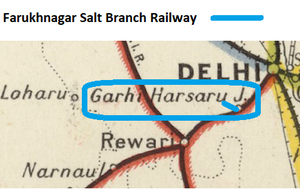Farukhnagar Salt Branch Railway: Difference between revisions
New page created |
mNo edit summary |
||
| Line 6: | Line 6: | ||
The Salt Works was closed in 1903-04 ''(see explanation below)''. | The Salt Works was closed in 1903-04 ''(see explanation below)''. | ||
''' | '''Farukhnagar''' was once an important trading centre for salt manufactured from saline water obtained from wells of 12 village estates located near the town. This salt was called ‘Sultanpur Salt’ after the location of the most important salt-works of the region<ref name=wiki>[https://en.wikipedia.org/wiki/Farrukhnagar Wikipedia ‘Farukhnagar’]; Retrieved 18 May 2019</ref>. | ||
'''Sultanpur''' was the centre of salt production for use in [[Delhi]] and the [[United Provinces]] until the late 19th century, exporting annually 680,000 maunds or 18,350 tons (1 maund = 37 kg approx.) by the Railway. | '''Sultanpur''' was the centre of salt production for use in [[Delhi]] and the [[United Provinces]] until the late 19th century, exporting annually 680,000 maunds or 18,350 tons (1 maund = 37 kg approx.) by the Railway. | ||
Latest revision as of 15:05, 20 May 2019
Farukhnagar Salt Branch Railway

The ‘Farukhnagar Salt Branch’ 7.6 mile(12km) opened in Feb 1873 as a metre gauge(MG) branch from Garhi Harsaru Junction on the Rajputana State Railway ‘RSR Mainline’ section between Delhi and Rewari [1].
The Salt Works was closed in 1903-04 (see explanation below).
Farukhnagar was once an important trading centre for salt manufactured from saline water obtained from wells of 12 village estates located near the town. This salt was called ‘Sultanpur Salt’ after the location of the most important salt-works of the region[2].
Sultanpur was the centre of salt production for use in Delhi and the United Provinces until the late 19th century, exporting annually 680,000 maunds or 18,350 tons (1 maund = 37 kg approx.) by the Railway.
Salt was produced by extracting brine from about 40 wells using bullocks and drying in open plots. Since salt was one of the major sources of government's revenue, the office of the Salt Superintendent at Sultanpur supervised the levy of Rs. 2 per maund (about 37 kg). With the levy of the heavy salt tax and acquisition of the ‘Sambhar Salt Work’ (see separate page) by the Government, the Sultanpur salt became uneconomical and by 1903-04 the salt industry was struggling for survival with salt export having fallen to 65,000 maunds or 1,750 tons leading to severe setback to the economy of Sultanpur area. Finally in 1923 the British shut down the office of the salt superintendent at Sultanpur, had all the mounds of salt thrown back into the wells and shut down the salt industry leading to considerable economic misery to the people [2].
Later History
In 1881-82, the ‘Rajputana-Malwa State’ (RMSR)- see separate page was created amalgamating, under single management, existing State Railways:-
- ‘Rajputana State Railway’(RSR) with this branch line.
- ‘Holkar State Railway’, which had opened 1874 from Khandwa reaching Indore, 1876.
- ‘Scindia-Neemuch Railway’ from Indore to Nimach, including a branch line from Indore to Ujjain opened in August 1876 . The entire line was completed in 1879-80
- ‘Neemuch Nasirabad State Railway’, Neemuch to Ajmer, the construction was started in 1879, and the work completed in March 1881
All these State railways were worked by Bombay, Baroda and Central India Railway(BB&CIR).
In 1900 the RMSR was merged into the Bombay, Baroda and Central India Railway(BB&CIR), becoming the latter's Metre Gauge(MG) section; known as Ratlam Division of BB&CIR.
Further Information
See Bombay, Baroda & Central India Railway Network - Lines owned and worked
References
- ↑ “Administration Report on Railways 1918” page 22 (pdf31); Retrieved 18 May 2019
- ↑ 2.0 2.1 Wikipedia ‘Farukhnagar’; Retrieved 18 May 2019